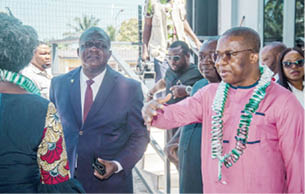The hike in electricity tariff for electricity consumers under Band A users has put a financial strain on public universities.
The hike, which had seen the electricity bills of universities increased by over 100 per cent led to disconnection of some of the universities due to their inability to offset the huge debt they are owing Electricity Distribution Companies (DisCos).
Even though the debts were amassed before the electricity tariff hike in April, it became more pronounced after, with the academic calendar truncated due to the black out in some notable university campuses in the country.
The troubling situation made the Secretary to the Committee of Vice Chancellors of Nigerian Universities (CVCNU), Prof. Yakubu Ochefu, to warn that the apathy of the federal government on the plight of the universities could result to 52 federal universities to collapse and jeopardise the education of millions of Nigerian youths.
- Nigeria’s power grid collapse and the economy
- Power outage: Small businesses turn to alternative energy
The CVCNU in its recommendation urged the government to move universities from Band A to a discretionary band with lower tariffs for educational establishments, stating that would allow universities to pay rates closer to what they previously paid, or only slightly higher, rather than the unsustainable commercial rates currently imposed.
While this could partly solve the issue of high electricity in public universities, given the challenges with the current electricity supply, many universities are already exploring alternative power solutions.
The University of Ilorin, for instance, is negotiating for alternative power supplies and incorporating provisions for these in new building designs. Energy-saving measures are also being implemented to reduce overall consumption.
Public universities that were disconnected by DisCos
Fresh on the list is the University of Ibadan College Hospital that was disconnected over N400m debt by the Ibadan Electricity Distribution Company (IBEDC) this month.
Similarly, the Aliko Dangote University of Science and Technology, Wudil, Kano State, was thrown into darkness in July, after the Kano Electricity Distribution Company (KEDCO) disconnected the university over N248m debt.
The Jos Electricity Distribution Company disconnected the University of Jos from the national grid in May over debts amounting to N126m. The same measure was meted to the University of Benin by the Benin Electricity Distribution Company (BEDC) in July over N300m unpaid electricity debt.
The Eko Electricity Distribution Company (EKEDC) in August disconnected power supply to the University of Lagos (UNILAG) over N1bn of unpaid bills.
Also, the Ahmadu Bello University, Zaria experienced a four weeks blackout in 2023 over its failure to pay N931m debt owed to the Kaduna Electricity Distribution Company.
UNN gets N900m solar car park
While transitioning to alternative power sources, requires substantial investment, which many universities cannot afford, stakeholders have urged the government and private sector to support the initiative of making public institutions not to rely on the national grid.
It is in response to this that Azura Power West Africa constructed a 240KW of solar car park worth N900m at the University of Nigeria, Nsukka (UNN)
Speaking during the commissioning of the project, Managing Director of Azura Power West Africa, Edu Okeke, stated that it was both a fulfilling milestone and a proud moment, one that started with a vision to empower the Faculty of Engineering, his alma mater, with sustainable energy solutions.
He stated that the project was initiated following discussions initiated by my good friend, Prof. Emeka Obe when he was the Dean of this faculty.
“Azura Power, as many of you know, is the developer and operator of the 459 MW Azura-Edo IPP, supplying around 10% of Nigeria’s grid power. Since our inception, we have understood that our impact extends beyond power generation. Through our corporate social responsibility initiative, “Power to Change,” we committed a significant portion of our resources to support education, health, infrastructure, and sustainable livelihoods, aligning with the UN Sustainable Development Goals (SDGs). Our annual CSR budget, initially set at One Million US Dollars (USD1m), is dedicated to projects like this—projects that create a lasting, positive impact in our host communities and across Nigeria”.
He said, the 240-kW solar car park at the Faculty of Engineering is more than a physical asset or infrastructural addition. It’s a commitment to Nigeria’s energy transition and a beacon of our dedication to educational and social advancement. We are immensely honoured to contribute to this vital endeavour.
He added that the project is expected to save around N150m annually in energy costs and reduce diesel usage by 135,000 litres per year—equivalent to cutting CO₂ emissions by 351,000 kg. This is a step towards a cleaner, more sustainable future for our environment.
Considering Nigeria as a federating nation, Okeke disclosed that Azura Power plans to expand this initiative to five more universities across Nigeria. Beyond universities, “We have already extended similar projects to schools like KNOSK School in Abuja and others in Edo and Borno States, with a goal of achieving 2 MW of solar capacity by 2035. Our mission is clear: to support education, reduce emissions, and drive sustainability across the country”.
Also speaking at the launch of the solar car park was the Vice Chancellor of the University, represented by Deputy Vice Chancellor Administration, Professor Rumanus Eze Okonkwo, who applauded the kind gesture of Azura Power West Africa, saying the provision of the 240KW solar car park to the university will address the lingering electricity crisis in the school.
He said the institution owes Enugu Electricity Distribution Company about N800, 000, 000 and the school has since been disconnected from national grid.
“We are happy with this development, some faculties and departments would rely on the solar car park for electricity, the intervention by Azura is a laudable initiative”.
The Minister of Power, Adebayo Adelabu who performed the ceremony said the power sector is driven by competence and total commitment in ensuring that the supply of electricity is uninterrupted.
He acknowledged the challenges faced by industry players and the policy makers, saying relevant windows of this nature, created by Azura Power under its Corporate Social Responsibility CSR, to provide alternative sources of energy to communities and institutions should be emulated by other investors in the sector.
Represented by the Director Renewable Energy Sunday Owolabi, the minister said Azura’s milestone in the development of renewable energy in Nigeria is in line with the federal government vision 30:30:30, when Nigeria targets the generation of 30 thousand megawatts of power.
FG to build mini grids in educational institutions – Power Minister
To soften the hardship the schools are facing, the Minister of Power, Adebayo Adelabu has disclosed plans to build mini grids in some higher institutions in the country to reduce the cost of electricity consumption by the institutions.
Adelabu made the disclosure when he inspected the Advanced Solar Micro grid project, being built at the University of Abuja. The project is about 95 percent completed.
He said the university solar project would be replicated in other universities, tertiary institutions and Teaching Hospitals across the country and it will shield those institutions from the high cost of electricity.
According to him, President Tinubu’s love and belief in education, as the bedrock of economic growth and industrial development, informed the decision to provide alternative sources of energy for the institutions.
“The backbone of economic growth and sustainable long term human capacity and human development lies in education, which is why we have focused on our tertiary institutions and teaching hospital facilities, to ensure that they are shielded from the high cost of energy”, the minister said.
He also added that the solar project would reduce the reliance of the recipient institutions on the grid.
Adelabu equally called on the University of Abuja authorities to ensure adequate, regular maintenance and protection of the grid.

 Join Daily Trust WhatsApp Community For Quick Access To News and Happenings Around You.
Join Daily Trust WhatsApp Community For Quick Access To News and Happenings Around You.


